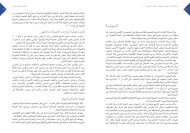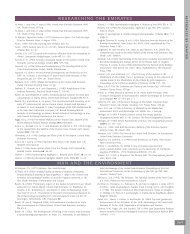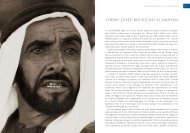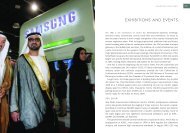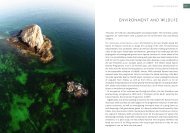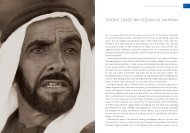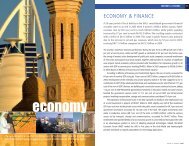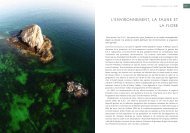92 UNITED ARAB EMIRATES YEARBOOK 2006<strong>ECONOMIC</strong> <strong>DEVELOPMENT</strong>93Business Competitiveness RankingWORLD <strong>ECONOMIC</strong> FORUM: GROWTH COMPETITIVENESS INDEX1401301201101009080706050403020100Finland0FranceAustriaSwedenSingaporeSouth AfricaCzech Rep.NorwayIndiaKorea, RepGrowth and Competitiveness RankingsGhanaBrazilKuwaitQatarUnited Arab EmiratesSri LankaKenyaPakistanBahrainThe great strides that have taken place in economic growth in the <strong>UAE</strong> and thecompetitiveness on which it depends in an increasingly-globalised world have beenrecognised in the 2005 World Economic Forum Report. In formulating the range offactors that go into explaining the evolution of growth in a country, the Reportidentifies ‘three pillars’: the quality of the macroeconomic environment, the stateof the country’s public institutions and the level of its technological readiness. TheGrowth Competitive Index (GCI) uses a combination of hard data – e.g. universityenrolment rates, inflation performance, the state of the public finances, the natureof the regulatory environment, the level of penetration of new technologies, suchas mobile telephones and the Internet, and less quantifiable data such as judicialindependence and government efficiency. These various factors are brought togetherunder different subindexes, each capturing a different aspect of the growth process(e.g. the importance of contract and law, the stability of the macroeconomicenvironment) and are aggregated to give an overall competitiveness score.The 2005 GCI Index ranks the <strong>UAE</strong> eighteenth in the world with a high score of4.99, (the United Kingdom, for instance is in thirteenth place and Germany infifteenth) and at the top of the list of the Gulf Cooperation Council (GCC) countries(Qatar is nineteenth, Kuwait thirty-third and Bahrain thirty-seventh). According tothe Report, the <strong>UAE</strong> is ’going through a particularly good phase. Terms-of-tradeEgyptZimbabweCameroonNigeriaPeruBulgariaAlgeriaBeninKyrzyg Rep.MoldavaBoliviaAlbaniaHonduras20 40 60 80 100 120Growth Competitiveness Rankinggains have boosted growth rates and reinforced already high levels of confidencein the business community, resulting from ongoing institutional modernizationand improvements in macroeconomic management.’ The Report also commentsfavourably on the fact that the Government has made good use of the revenuefrom higher oil prices ‘to reduce debt, to invest and to save’.The Business Competitiveness Index (BCI) specifically measures two areas that arecritical to the microeconomic business environment: the sophistication of companyoperations and strategy and the quality of the national business environment,especially in relation to the transparency of the environment, the level of bureaucracyand the strength of the financial markets. The BCI ranks the <strong>UAE</strong> at thirty-third,again high up in the list of developing countries and topping the list of GCC countries.It is thirty-sixth in the company operations and Strategy ranking and thirty-thirdin quality of the national business environment ranking. The Technology Index (TI)ranks the <strong>UAE</strong> thirty-third on a world scale, again the highest-ranked GCC countrywith Qatar at fortieth, Bahrain at forty-first and Kuwait at forty-eighth. TI measuresInternet access to schools, frequency of interruptions, government priority in ICT,personal computer and Internet users per capita. At company level, technologicalabsorption has been among the most advanced and public access to the Internethas grown rapidly and is one of the highest in the region.
94UNITED ARAB EMIRATES YEARBOOK 2006<strong>ECONOMIC</strong> <strong>DEVELOPMENT</strong>95THE BUSINESS ENVIRONMENTFollowing years of success in promoting diversification of the <strong>UAE</strong>’s economy andcreating numerous opportunities for private investment in <strong>UAE</strong>-based businesses,leading government officials and finance experts are the first to admit that there isstill considerable scope for investment growth, both through encouragement ofprivate national investment in the <strong>UAE</strong> and through further attraction of foreigndirect investment (FDI). The latter climbed five-fold in the three years from 2000to 2004, reversing the trend of the 1990s. In 2004, about US$9 billion (Dh33billion) of FDI flowed into the country, and the IMF projected inflows of US$10.3billion for 2005. But it is also clear that business opportunities and incentivesby themselves are not enough to promote investment. Attention has, therefore,been focused on creating an even more positive business environment that adoptsbest practice methods and appropriate legal frameworks and is transparent.Much progress has already been made in this regard. The World Bank hasidentified the <strong>UAE</strong> as one of the least cumbersome countries in which to set upa new business. According to a recent report, the World Bank stated that only29 days is needed to set up a new business in the <strong>UAE</strong>, whereas the averageperiod for the Middle East and North Africa (MENA) region is 60 days. The reportestimates the cost of setting up a new business (as a percentage of gross percapita national income) in the <strong>UAE</strong> at 24.4 per cent compared to the MENAaverage of 76.1 per cent. Again, at ten procedures for setting up a new business,the <strong>UAE</strong> is also lower than the MENA average of 12.The Washington-based Heritage Foundation’s Economic Freedom Index for2005, published annually in the Wallstreet Journal, ranked the <strong>UAE</strong> the highestin the Arab world, with a score of 2.68 out of 5.00, and lists it in the ‘mostly free’category. It ranked in the top third of the 161 countries assessed.Foreign investment has, to some extent, been affected by legislation thatprohibited non-nationals owning more than 49 per cent of registered enterprises.However, 100 per cent ownership by non-nationals is permitted in free zones andexpatriate ownership of real estate, pioneered in Dubai, is now possible, undercertain circumstances, in other emirates, including Abu Dhabi.The Emirate of Abu Dhabi has made further progress with its long-term strategyto diversify its economic base and reduce its dependence on volatile oil and gasrevenues. Creation of the Higher Corporation for Specialised Economic Zones(HCSEZ) was a major step in a series of measures to promote diversification. Thenew corporation aims to provide an integrated infrastructure, a suitable businessenvironment and professional services through establishing and managing specialzones in Abu Dhabi. The objective is to make the emirate an attractive place forlocal and international investment. Other objectives include the promotion of localindustries and the creation of appropriate opportunities to attract and train <strong>UAE</strong>nationals so that they may play an active role in business development. Thecorporation will also seek to develop and encourage small, medium and specialisedindustries and will encourage the private sector to become involved in themanagement of the zones. This will be done, in part, through the commissioning offeasibility studies and investment in the appropriate electronic and IT infrastructure.Investment in the <strong>UAE</strong>’s industrial sector increased by 44.3 per cent in 2004to nearly Dh6.3 billion, compared to Dh4.3 billion in 2003. Industrial zones andindustrial cities are transforming the face of the <strong>UAE</strong>’s manufacturing and industrialbase. The success of projects such as Abu Dhabi’s new Industrial City is fuellingexpansion plans that are often implemented almost as soon as the initial projectsare completed. Consideration has been given to doubling or tripling the area ofthe Industrial City, which presently covers about 24 square kilometres and hasattracted Dh6 billion in terms of investment. Meanwhile, smaller enterprisesare not being forgotten and a special SME unit has been established to promotesuch operations. The Department of Economy and Planning’s licensing systemshave been simplified to streamline registration procedures, and it is now possibleto secure trade licences through the department’s website and an SMS servicethat informs customers when their documents are ready.The Abu Dhabi government is also privatising a number of state-ownedcompanies. This is being handled through the General Holding Company (GHC),which has taken over the industrial holdings of the General Industries Corporation,which has been wound up. Resolution No. 5 for 2004 provided the legal andorganisational framework for the take-over. The new body is undertaking saleof stakes in public utilities to the private sector as part of the emirate’s strategyto forge a public-private partnership and stimulate local financial markets. Thecompanies to be privatised include fodder, cement, steel and pipe plants andflour mills. The privatisation programme has already had a positive impact onthe local stock markets as the newly privatised firms obtain listings.Industrial development is continuing throughout the <strong>UAE</strong>. The master plan forDubai Industrial City was completed in mid-2005. The new ‘city’ will promotegrowth of the sector through clustering of industrial activities, establishment ofa dedicated industrial growth fund, an international engineering academy, adedicated logistics zone and a commercial area that will extend along the EmiratesRoad. Additionally, residential communities and retail developments with high risetowers, boardwalks, a canal, piers and promenades will enhance this development.One particular focus of interest, not surprisingly, is the oilfield supply sectorwhere a major dedicated complex is planned. Nearly 530 companies in Abu Dhabiare already active in this sector in various ways, with annual turnover of overUS$1 billion. In order to attract the necessary foreign investment, the Abu Dhabi



